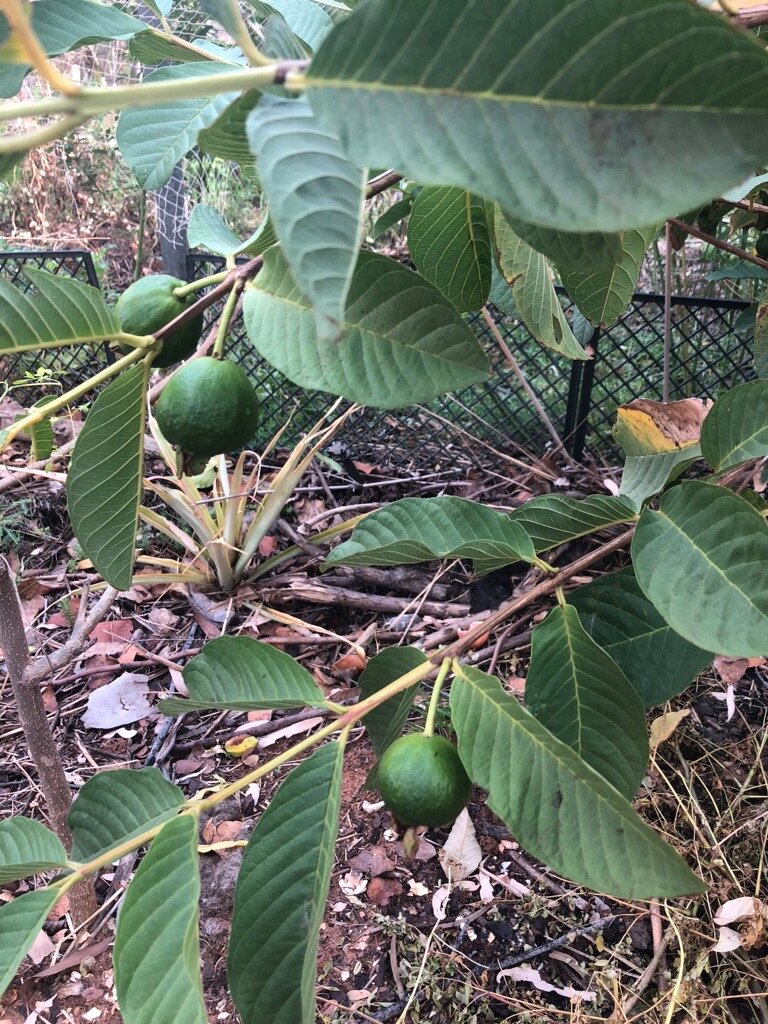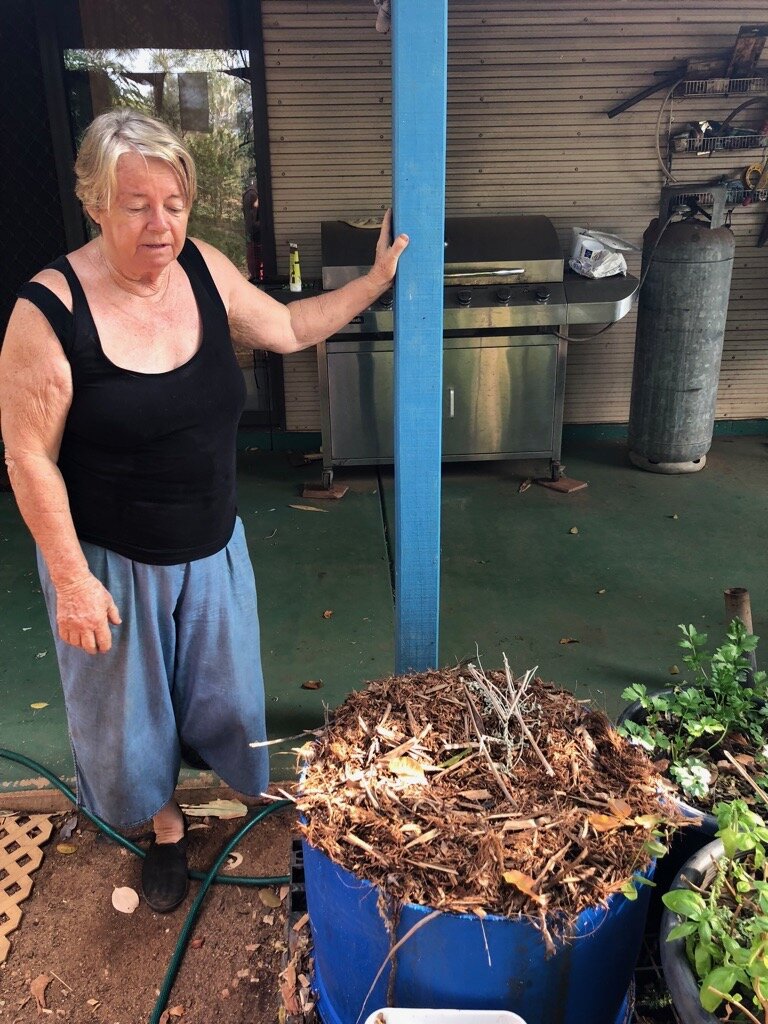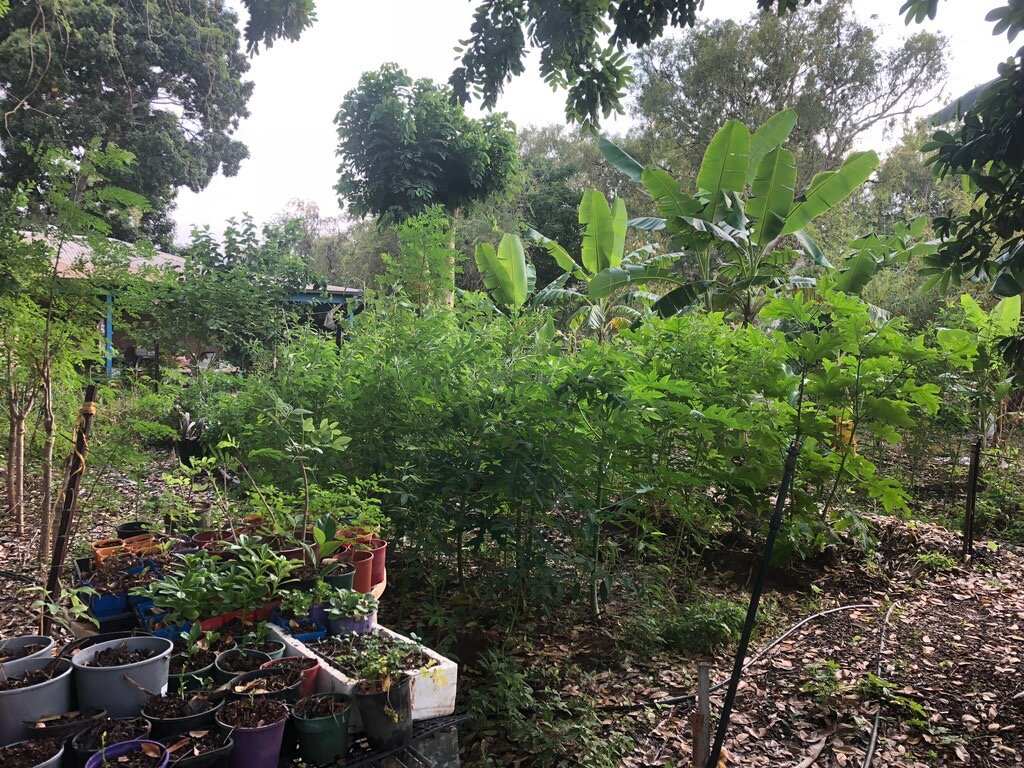
What we are trying to do here, is establish an environment that gives us a constant supply of appetizing, and nutritious food using our own abundant resources.
Located just outside of Derby, Western Australia on Windjana Road, Windjana Wellness Centre is committed to building community resilience by growing arid-tropical food all year round including local bush food and utilizing the resources that exist on hand.
Sunlight, water, good soil, a clean environment, and access to an abundance of organic wastes that can be used to feed the soil and ensure that the food we grow is tasty, nutritious and affordable.
To do this we utilize the Ethics and Principles of Permaculture, the methods of traditional Natural Farming and the systems of Syntropic Farming. There is on the internet an abundance of information about these approaches. The trick is to find the methods and plants that work best for us here in our unique Kimberley environment.
“The property now is a thriving food forest. You can wander around the five acres and pick a passionfruit or a papaya, a bean, okra or some greens”
"There are sweet potatoes providing protection to the soil with their abundant leaves and giving us potatoes and greens at the same time.
"There are chillies in abundance, hanging like red and green jewels on strong healthy bushes; there are guavas and custard apples, star apples and lots of other fruit and veggies.
"There is high shade that provides protection from the sun; there are flowers and wonderful scents in the air. The native trees are still there, providing shade and support to introduced food plants."
Wendy Albert at Windjana Wellness
The Power of Place
Permaculture is based on the ethics of caring for the earth and ourselves and returning surplus to the earth and other beings. Its philosophy is to observe and follow nature's way by returning everything to the soil, and to use resources efficiently — including lots of compost.
Becoming Resilient
At the moment in Derby, apart from people who go fishing & hunting regularly, almost every bite we eat has travelled on a truck for at least a week before it gets to the Supermarket shelves. Thus, it cannot be considered fresh and is most likely heavily laced with preservatives and pesticides.
Our primary food supply depends on the road network from Perth and the eastern states. In times of flood or other catastrophes there is less than one weeks supply of food available in our stores..
Changing Expectations
In order to grow food both in the home garden and for the general community in a natural way without too much back breaking labour and effort, there are a few obstacles that we need to think about and overcome.
This can mean changing some of our expectations - even changing what we eat! However, if these changes can make us healthier, thus happier and more self-sufficient they are probably worthwhile.
Tried and Proven
Inspired by the Chinese, Japanese, station and mission gardens that were established in Broome and Derby in the early part of the last century to feed the growing towns and communities, we are growing perennial and seasonal foodstuffs with natural farming methods and utilizing local resources such as:
waste food composting (Bokashi),
animal manures
green manures grown on site.
“Our philosophy here is to observe and follow nature’s way by returning everything to the soil, and to use resources efficiently — including lots of compost. ”
It all starts and ends with the soil
The most essential aspect of growing anything is the soil. We need to feed and protect the soil. This is the foundation on which all sorts of good food will grow in abundance without high cost and strenuous labour.
The best way to feed the soil is to return to it everything that has been taken out – food waste, tree prunings, grass clippings, paper and cardboard etc.
Chop & Drop
Lemon Grass can provide good mulch
A key Permaculture technique that supports this principal is that of ‘chop & drop’ i.e. constantly pruning fast-growing trees to provide both mulch and food for the soil. Here in Derby during the wet we have fast-growing leguminous trees such as acacia (wattle), moringa, Gliricidia sepium (mother of cocoa). Peanuts and mung beans also virtually grow wild during the wet along with bamboo, lemon grass & vetiver.
All these plants can provide the humus and nutrition our soil needs to grow those food crops that we have become accustomed to and dependent upon.
Bokashi Composting
Left: Soil after Bokashi, Right: Derby pindan
Another key aspect of our garden development here is Bokashi composting - feeding the soil with fermented food waste. Also, the practices of Natural Farming (NF). These techniques encourage indigenous micro-organisms to flourish in the soil through composting and fermentation and utilize organic waste products to feed the soil and the growing plants.
Biochar
The beginnings of a biochar wicking bed
Given the porous quality of our Pindan soils and the often extreme vagaries of very hot, very dry or very wet conditions of our climate, it’s important to provide a holding capacity for the micro-organisms cultivated in the soil. This is the function of Biochar. Again, we look at how nature does it and how people have managed nature to their advantage through centuries. Locals here in the Kimberley knew that if they burned a certain piece of bush the regrowth would be strong. Part of this practice is the need of some plants to be stimulated by smoke to germinate, part is the charcoal left by the fire providing ‘apartment blocks’ or little reefs for the micro-organisms to live in. Charcoal is porous, it consists of millions of tiny spaces in which soil organisms can nest and multiply and thus provide food to growing plants.






































